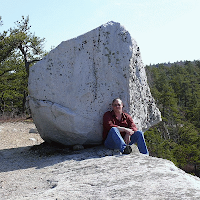The latest Gallup Poll shows, once again, most Americans are creationists. It hasn't changed much over the past 30 years, although there has been a slight uptick in creationism versus theistic evolution (hopefully not a trend).
So, of course, the question is "Which of the following statements comes closest to your views on the origin and development of human beings?" There are three responses you can choose.
The response - "Human beings developed over millions of years from less advanced forms of like, but God guided the process" - is termed theistic evolution. This is what you have to go with if you're religious, and want to believe in a personal God, but don't want to throw out science.
The response - "God created human beings pretty much in their present form at one time within the past 10,000 years or so" - is the strict creationist position and is completely unsupported by modern science.
The response, "Human beings developed over millions of years from less advanced forms of life but God had no part in the process" - is interesting. While thought of as the atheistic response, I suppose there are certain forms of theism where one can believe in a completely hands-off type of God when it comes to the evolutionary history of humans.
Not surprisingly, these positions correlate rather well with educational level. It's obviously easier to reject science if you're not well educated (although 25% of the creationists had postgraduate degrees, I'd be willing to bet money that virtually none of those degrees are in strict science fields!).
Also not surprisingly, these positions also correlate well with church attendence:
and political affiliation:
So, if you're a Republican who attends church every week and only have a high school diploma, you're very likely a creationist. Tell us something we don't know Gallup.
As a geology professor, who does cover human evolution (albeit briefly) near the end of my Historical Geology course, these results are disheartening. I think it's even worse than it appears because 10,000 years is generous with most creationists who still hold fast to the early 1600s Archbishop James Ussher date of 4,004 BC for the creation of the Earth and man.
In reality, most U.S. creationists don't just believe humans are recent, which is bad enough, but that the entire universe, galaxy, solar system, earth, and all life is recent. This means virtually all of science (physics, chemistry, astronomy, geology, biology, etc.) is utterly rejected.
I've also never once met a creationist who also wasn't a religious believer. In other words, their creationist beliefs were never developed by a study of science, but from their initial belief in Christianity, Judaism, or Islam and then trying (poorly) to fit science into that faith framework.








Since magic is not a mechanism of evolution, "God guided the process" is throwing out science. Therefore 85% of Americans reject science.
ReplyDeleteI think the uptick of literalist "the earth is 6000 years old" is due to increasing polarization within Christianity. Mainstream churches are still losing members to non-believers and fundie/evangelicals, although I did read recently the non-believers group (not necessarily atheist) is now growing much faster than the evangelicals.
ReplyDeletealso, there's 7% missing. Did they answer "don't know/refuse to answer"?
No surprise here. According to Gallup in the "Implications" section: "Most Americans are not scientists, of course, and cannot be expected to understand all the latest evidence and competing viewpoints on the development of the human species." Gallup is right. The majority of Americans are probably not willing to make the effort to think. So, God did it. Case closed.
ReplyDelete